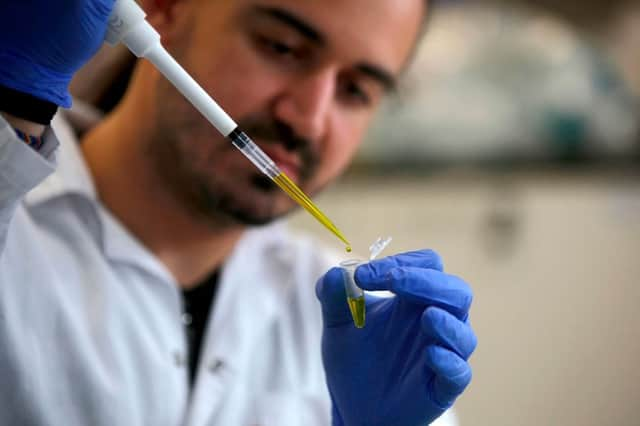Is there a coronavirus vaccine and will it help control the outbreak?


Work on a vaccine for the coronavirus is well underway, it has been confirmed, but it will likely not be ready in time to prevent a full outbreak in the UK.
The Government's Chief Scientific Adviser, Sir Patrick Vallance told BBC Radio 4's Today programme that while “it's not unreasonable to assume that we will end up with a vaccine”, it will likely take between a year and 18 months before it is ready.
Here’s everything we know about the vaccine so far.
Advertisement
Hide AdAdvertisement
Hide AdIs a vaccine being developed for the coronavirus?
In early January, the Chinese government made its information on the coronavirus’s RNA sequence publicly available so that researchers around the world could get to work on developing a vaccine.
A vaccine works by providing an individual with acquired immunity to a particular infectious disease by exposing them to it in a controlled fashion, so having this information has provided a huge boost.
As a result, work has already begun in the USA, Europa and Australia, with more than 30 different institutions currently working on a vaccine.
Researchers at Australia’s Doherty Institute were the first to grow a live sample of the virus outside of China, further boosting international efforts to manufacture a vaccine.
Advertisement
Hide AdAdvertisement
Hide AdA team of researchers working for American pharmaceutical giant Inovio are currently working on a vaccine for the coronavirus.
Scottish scientist Dr Kate Broderick confirmed on Thursday 5 March that the vaccine has already been through successful animal trials and will begin human testing shortly.
The project is currently months ahead of schedule and will now aim to begin clinical trials in April.
When will it be ready?
While the speed at which the vaccine is being developed is “unprecedented” according to Dr Broderick, there is still a long way to go before it could become publicly available.
Advertisement
Hide AdAdvertisement
Hide AdHistorically, vaccines have taken years to develop and, while the international co-operation on show may drastically reduce that timeframe, the World Health Organisation has said that it could still be as long as 18 months.
Sir Patrick Vallance, has said he does not think a working vaccine will be produced in time for the coronavirus outbreak.
In his BBC Radio 4 interview, he said: "I don't think we will get the vaccine for this outbreak. I don't think we'll get something in time or at scale for this outbreak."
Assuming the clinical trials go ahead in April, they will take months to complete. Rigorous clinical tests have to be carried out gradually over a long period of time to ensure that the vaccine is both safe and effective.
Advertisement
Hide AdAdvertisement
Hide AdIf the trials all prove successful and the vaccine is cleared for use, there is still the matter of mass-producing it at a level high enough to combat the rapidly spreading virus.
In all likelihood, it will be some time next year before a vaccine becomes available.
Like Dr Broderick, Sir Vallance was quick to emphasise how impressive the progress has been, saying that the idea of having a vaccine ready in 18 months was “remarkable when you consider just a few years ago it would have taken 20 years to do that.”
There is then the further problem that the virus could continue to mutate in ways that would render the vaccine ineffective.
Advertisement
Hide Ad